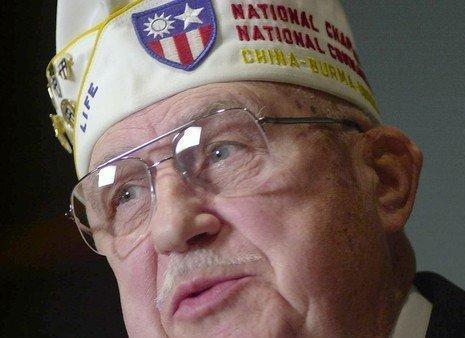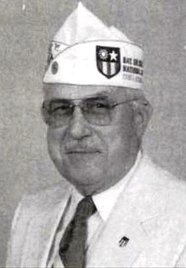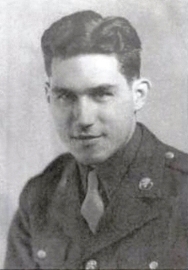Wendall Phillips could have been a bitter man.
As a 21-year-old radio operator for the U.S. Army Air Forces in the European Theater, Wendall was shot down in 1944 and captured by the Germans.
Then, after escaping, he was sent to fight in the China-Burma-India Theater and landed in a Japanese prisoner of war camp, where he was tortured.
But friends say Wendall always believed God would bring him home during those dark days.
He spent a lifetime helping others both with his words as a chaplain of a veterans post, and with acts such as the time
in 2008 when he shared a stage with a German prisoner of war.
"There was Wendall Phillips and just four feet away from him was this man who was a German officer in Hitler's army,
talking about their respective experiences. The audience was spellbound," said Joseph Garrera, executive director of the
Lehigh Valley Heritage Museum.
"In the end, true to form, Wendall stood up and said to this German officer, 'Let me give you a hug, son.'
It was such a moving moment of reconciliation. That was Wendall Phillips."
Wendall, who lived with his wife of 64 years, Frances, in Hanover Township, Northampton County, is perhaps best remembered
for the work he did for veterans.
Wendall was the National Chaplain of the China-Burma-India Veterans Association, speaking at the funerals of many of his fellow
veterans. He was also a most familiar face at veterans meetings in the Lehigh Valley where, if prompted, he would speak
about flying the most dangerous missions in World War II, "The Hump" supply route over the Himalaya Mountains to China.
He helped establish the Veterans of Foreign Wars post in the Lehigh Valley honoring retired Brig. Gen.
Anna Mae McCabe Hays, who grew up in Allentown, headed the Army Nurse Corps and was the first woman in the U.S. military
to become a general.
"He was a very kind person, very jovial," said Hays, who now lives in Virginia. "It's hard to explain but he was so considerate
of others."
Joseph Zeller, who helped found the VFW post, said he often sought out Wendall's advice on veterans issues when he was a
state legislator, despite their different political allegiances.
"The only thing he and I disagreed on was this election," said Zeller, who also once served as Emmaus mayor.
"He was always saying he is for Romney, and I'm for Obama. Up to the end, we had fun kidding each other about it."
Zeller said Wendall excelled at public speaking, a skill he honed by comforting bereaved military families and helping
a new generation understand the story of the "Greatest Generation."
Wendall's military story started in 1942 when, at 19, he left college at the Crane Institute of Music in Potsdam, N.Y.
Trained as a radio operator, he flew 2,500 hours with the Air Transport Command.
Stationed on the southern coast of England, his crew took emergency supplies and equipment to France and brought the
walking wounded back to British hospitals.
He flew many missions in icy conditions and survived five crashes, including one in 1944 near the French-Belgian border.
After it, he was captured and imprisoned in a German camp near Leuze, Belgium.
Zeller, who heard the story several times, said Wendall had been in a hospital-like portion of the camp and sneaked out
with two other prisoners one night when the guards weren't on lookout. He had been there 33 days.
At community forums over the years, Wendall described how they escaped through an opening in the electrified barbed-wire
fence and, hiding during the day, walked for three nights.
While he was hiding with goats in a barn, a farming family discovered him and hid him in their cellar until a
Catholic priest came. The priest connected Wendall with the French Underground, which helped him return to the American lines.
By the following year, Wendall was in the China-Burma-India Theater flying "The Hump" between China and India.
His unit used C-47 and C-46 aircraft, sometimes loaded with 55-gallon drums of fuel.
"There were a great many accidents with loss of aircraft and personnel," he wrote in a typed, four-page essay from
2011 that Zeller shared. "I am a survivor of a couple of those, personally."
On one of those crashes, Wendall was taken as a prisoner a second time.
"He said that the Germans treated him fairly well and fed him more than he expected, but he suffered excruciating,
agonizing pain torture by the Japanese," said Garrera, who heard the story during the Lehigh Valley Heritage Museum forum.
"They removed all his fingernails, trying to get information that he didn't have."
When Wendall returned home after the war, he finished college and married Frances, his college sweetheart, in 1948.
They had three children and he became ordained as a Presbyterian elder.
He worked as a manufacturer's representative, a municipal manager and a statistician.
He came to Pennsylvania in 1958 as an investment and insurance counselor in Harrisburg and then accepted a job as
Susquehanna Township manager. By 1968, he had moved to the Lehigh Valley, where he became Whitehall Township secretary-manager.
He later took a position as Schuylkill Haven borough manager.
But many knew him from his work in organizing and leading veterans groups, including presenting the invocation 2004 at the
Lehigh Parkway in Allentown before President George W. Bush spoke.
Friends described him as having an unwavering love for his country, rallying a new generation in the aftermath of the
9/11 terrorist attacks. At a 2001 Veterans Day gathering in Hackett Park in Easton, Wendall told the crowd that he was
ready to fight again.
"Sixty years ago next month, I was angry. Our country was attacked from outside sources," he told the crowd,
referring to the Japanese attack on Pearl Harbor. "I was 18 and I was able to do something about it Dammit, I'm angry
once more. I'm 78 now. Like most of you [veterans], we would go back and serve this great country."
In his final years, Wendall was intent on preserving his generation's legacy, donating World War II items to the
Lehigh Valley Heritage Museum as members of his groups passed on.
In the four-page essay from 2011, he was increasingly aware of his own mortality.
"I feel that I am better able to face the inevitable as I reflect back over my own life and deeds," he wrote.
"In aiding others, I feel that God's tasks for me on this Earth have been accomplished as I have attempted to care for
others in my life. Only God knows my successes and my failures."



